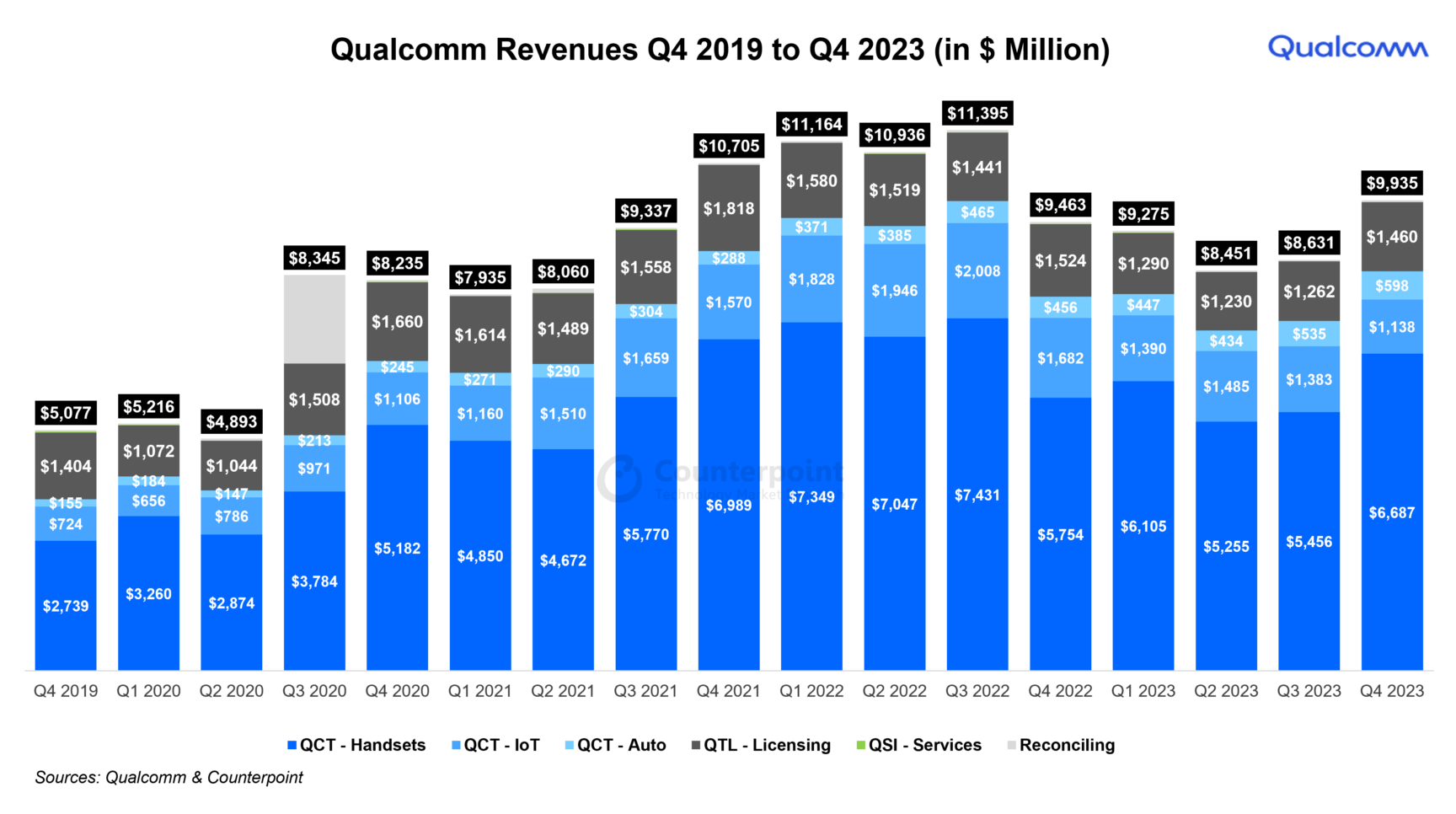- Handset revenues were driven by flagship chipsets and Chinese OEMs’ growth.
- IoT inventory levels were still high. They are expected to normalize by Q2 2024.
- Auto continued to gain momentum with silicon design wins and a lengthening pipeline.
- Multiple key licenses got extensions, including with Apple, Samsung and Chinese smartphone OEMs.
Driven by the handset and automotive segments, Qualcomm’s revenues grew 5% annually and 15% sequentially in Q4 2023, above the high end of the guidance. Handset revenues were driven by flagship chipsets Snapdragon 8 Gen 3 and 8 Gen 2’s design wins and demand from Chinese smartphone OEMs. The automotive segment was driven by increased content in new vehicles along with smartphone digital platforms. Overall, the inventory came down to normal levels with the demand from smartphones coming back on track. IoT inventory levels were still high in the industrial and edge networking segments, with some stabilization on the consumer side. Qualcomm expects the IoT inventory to normalize by Q2 2024.
Device AI adoption at edge
CEO Cristiano Amon: “It’s not only unique to the Galaxy S24 that has a number of use cases running GenAI on the device. But we’ll also see that happening with some of our other customers from China launching a number of models. So, I think we have a large number now of models being ported into our hardware for gen AI. I think we’re starting to see the beginning of new use cases. Reviews have been positive, and we are happy with we’ve seen the results following the launch.”
Tarun Pathak’s analyst take: The share of Generative AI (GenAI) smartphones in the overall smartphone market will be in single digits in 2023. But those numbers will not accurately reflect the amount of excitement and marketing hyperbole we are expecting to see. We expect GenAI smartphones to hit an inflection point in 2026 as the devices permeate through the broader price segments. The coming year will be pivotal for GenAI smartphones with preliminary data projecting their shipments to reach over 100 million units in 2024, according to an upcoming report, ‘GenAI Smartphone Shipments and Insights’, from Counterpoint Research’s Smartphone 360 Service. By 2027, we expect GenAI smartphone shipments to reach 522 million units, growing at a CAGR of 83%.
Outlook for Smartphones in 2024
CFO Akash Palkhiwala: “We entered fiscal ’24, our view was that Android channel inventory had largely normalized. And so as we go through the year, we typically see normal build bleed cycle around handset launches.
So, that’s kind of the phase we are in from our perspective. In the first quarter, what we saw was higher demand due to the acceleration of Android flagship launches with our new chip, Snapdragon 8 Gen 3. And we saw very strong demand across all the major Android OEMs. And so happy, of course, with that traction and that momentum carries over to the second quarter as well.”
Parv Sharma’s analyst take: We are assuming Android volumes will recover somewhat, as excess inventory in finished goods, which was a drag on the market throughout 2023, allowing an inflow of new models. However, we also expect some new inventories to be built in 2024 as competitive forces (Huawei resurgence) and uncertain demand (China and Europe weakness) continue to hamper demand forecasting at OEMs. We forecast smartphone AP/SoC shipments to grow in the low single digits in 2024.
Weakness in IoT and outlook
CFO: “From an IoT inventory perspective, what we have seen is stabilization really on the consumer side. As you know, we were one of the first to call out the weakness in IoT, and now we’re seeing it go through both on the industrial and the edge networking side. And consistent with our previous comments, we think the first quarter was the bottom for our IoT revenue stream. We’re guiding second quarter up mid- to high single digits. Second half of the fiscal year, as we see the inventory channel kind of normalizing and end markets kind of benefiting from that, we’re excited about what our product portfolio can bring.”
Anish Khajuria’s analyst take: Global cellular IoT module shipments are projected to decline by 5% YoY in 2023. However, the demand is expected to revive by the second half of 2024, with substantial growth predicted for 2025, coinciding with the mass adoption of 5G and 5G RedCap. In the long term, the cellular IoT module market holds promise and applications such as smart meter, router/CPE, POS, automotive and asset tracking will be driving most of the growth for this market.

Result summary
- Growth in revenues: Qualcomm’s revenues grew 5% annually and 15% sequentially in Q4 2023, driven by the handset and automotive segments.
- Flagship Android AP/SoCs drive growth: Handset revenues grew 16% annually and 23% sequentially in Q4 2023 driven by flagship chipsets Snapdragon 8 Gen 3 and 8 Gen 2’s design wins and demand from Chinese smartphone OEMs.
- Automotive continues to drive growth: The company’s automotive segment was driven by increased content in new vehicles along with smartphone digital platforms. In 2023, 75 new models were launched commercially with Qualcomm’s Digital Chassis platforms. Further, on-device AI will enable more silicon content gains in ADAS and cockpit solutions.
- IoT to come back to growth: IoT revenues declined 32% annually and 18% sequentially due to weakness in demand from elevated inventory levels in the channel. Industrial and edge continued to be weak with some demand coming back in consumer IoT. Qualcomm guided that growth would come back in mid-2024.
- Seasonal decline: Qualcomm guided a sequential decline in Q1 2024 revenues due to seasonality. Android revenues will be flat, IoT revenues will grow in mid-to-high single digits, and auto revenues will decline.
- Inventory levels: Smartphones are now at normal inventory levels, while the IoT inventory is expected to normalize by Q2 2024.
- Extension for key licenses: Apple is extending its license for baseband modems by two years to March 2027, while long-term agreements with Chinese smartphone OEMs are being renewed. A multi-year agreement with Samsung has fetched a third extension. These highlight the importance of Qualcomm’s core IP and product leadership.
- Snapdragon Elite X launching in 2024: For PCs, the Snapdragon Elite X will launch in mid-2024. It offers new GenAI features and better performance and battery life for Windows-based PCs.

